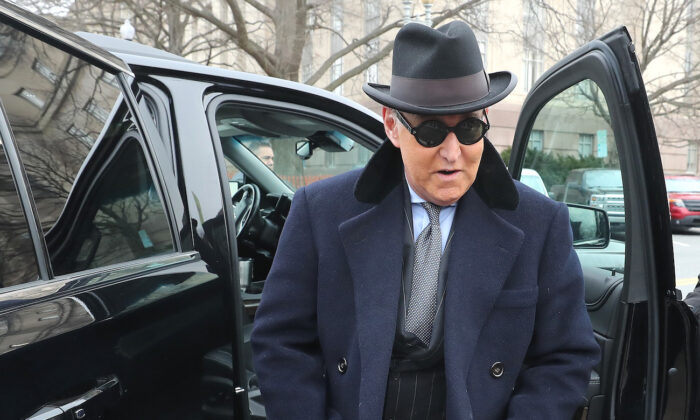The Justice Department has launched an internal inquiry into the circumstances surrounding the handling of the criminal case of Roger Stone, former political adviser to President Donald Trump.
The probe by the department’s inspector general will reportedly look into Attorney General William Barr’s February decision to override a sentencing recommendation for Stone made by rank-and-file prosecutors. The prosecutors recommended a sentence of seven to nine years in prison for Stone, but the department later filed another recommendation asking for a lighter sentence.
The DOJ’s Office of the Inspector General would not “confirm or deny the existence of any ongoing investigation” to The Epoch Times.
Meanwhile, DOJ spokeswoman Kerri Kupec told media outlets that they “welcome the review.” She did not immediately respond to The Epoch Times’ request for comment.
The revelation of the inquiry was reported earlier on Monday by NBC, citing anonymous sources. The report claims that the inquiry was triggered by the testimony of Aaron Zelinsky, who testified before Congress in June, and will focus on the events in February. The Epoch Times cannot independently verify these claims.
Zelinsky, one of the four prosecutors who withdrew from the case, told the House Judiciary Committee that the U.S. attorney in charge of the case, Tim Shea, was “receiving heavy pressure from the highest levels of the Department of Justice to cut Stone a break, and that the U.S. Attorney’s sentencing instructions to us were based on political considerations.”
He also testified how the DOJ was “exerting significant pressure on the line prosecutors in the case to obscure the correct Sentencing Guidelines calculation to which Roger Stone was subject—and to water down and in some cases outright distort the events that transpired in his trial and the criminal conduct that gave rise to his conviction,” according to his opening statement.
At the time, the DOJ disputed Zelinsky’s account, saying that Zelinsky, who did not have any discussions with any member of political leadership about the sentencing, had based his allegations on his “own interpretation of events and hearsay (at best), not first-hand knowledge.”
 Roger Stone, former adviser to President Donald Trump, departs the E. Barrett Prettyman United States Courthouse in Washington on Nov. 15, 2019. (Win McNamee/Getty Images)
Roger Stone, former adviser to President Donald Trump, departs the E. Barrett Prettyman United States Courthouse in Washington on Nov. 15, 2019. (Win McNamee/Getty Images)Stone, 67, told the Washington Examiner that he welcomed the investigation because “it will ultimately prove that at least two of the former prosecutors in my case have lied about the sentencing process under oath.”
“I am highly confident that once this investigation is completed, Aaron Zelinsky will be indicted for perjury and for lying to Congress under oath,” he told the news outlet.
Stone did not immediately respond to The Epoch Times’ requests for comment.
The handling of the Stone sentencing drew intense scrutiny, with many critics accusing Barr of giving preferential treatment to associates of the president.
Prosecutors originally recommended seven to nine years’ imprisonment for Stone, who was convicted of lying to and obstructing Congress and witness tampering. The Justice Department, however, intervened in the case, calling the recommendation “excessive and unwarranted.”
The department then filed a revised sentencing memorandum that asked for “a sentence of incarceration far less than 87 to 108 months’ imprisonment,” but did not offer a specific prison recommendation.
The department’s announcement to revise their sentencing recommendation came hours after Trump weighed in on Twitter about the seven-to-nine years recommendation. Justice Department’s spokeswoman Kerri Kupec told media outlets that the DOJ didn’t consult with the White House about Stone’s sentencing. She added that the decision to change the sentencing request was made before the president wrote about it on Twitter.
The four line prosecutors involved in the case withdrew from the Stone case on the same day of DOJ’s announcement.
The judge in the case eventually sentenced Stone to 40 months in prison. His sentence was later commuted by Trump days before he was to surrender to prison.
While testifying before the House Judiciary Committee in July, Barr defended his move, saying that while the particular sentencing enhancements could have applied and increased Stone’s prison sentence, “it really didn’t reflect the underlying conduct” in this case.
 Attorney General William Barr testifies during a House Judiciary Committee hearing on Capitol Hill in Washington on July 28, 2020. (Chip Somodevilla/Getty Images)
Attorney General William Barr testifies during a House Judiciary Committee hearing on Capitol Hill in Washington on July 28, 2020. (Chip Somodevilla/Getty Images)“And the overarching requirement at the Department of Justice is that we do not presume and automatically apply the guidelines. We make individual assessments of the defendant and what is really just under the case, and nothing that is excessive,” the attorney general told lawmakers.
He said the prosecutors were trying to pressure the U.S. attorney, who was new to the office, to adopt the seven-to-nine-years recommendation.
“And I made the decision no, we are going to leave it up to the judge,” he said.
The attorney general has repeatedly said that he supports the prosecution of Stone but he only intervened because the sentence was overly harsh.
“I agree the president’s friends don’t deserve special breaks, but they also don’t deserve to be treated more harshly than other people,” he said.
Focus News: Justice Department Watchdog Probing Handling of Stone Sentencing
US Government Issues Draft Amendment to Cut Reliance on Russian Uranium
